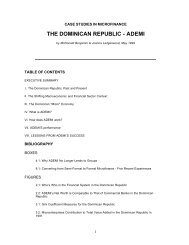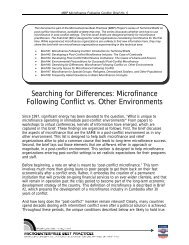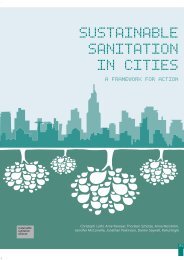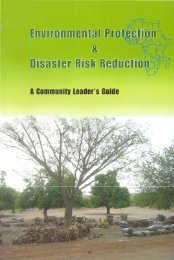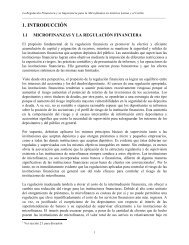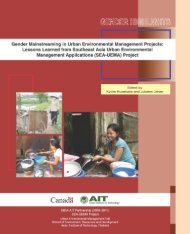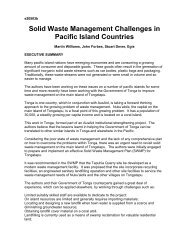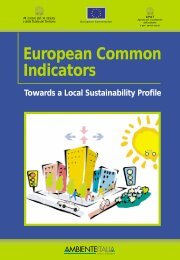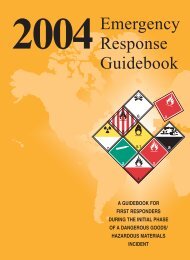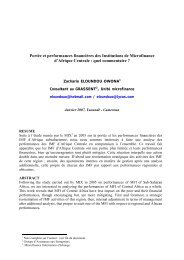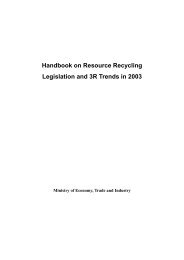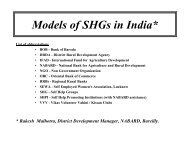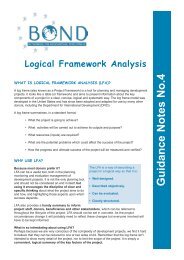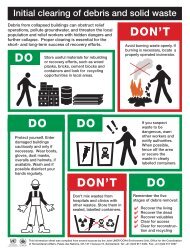The International Implementation Scheme (IIS) - Unesco
The International Implementation Scheme (IIS) - Unesco
The International Implementation Scheme (IIS) - Unesco
Create successful ePaper yourself
Turn your PDF publications into a flip-book with our unique Google optimized e-Paper software.
DESD <strong>International</strong> <strong>Implementation</strong> <strong>Scheme</strong> (<strong>IIS</strong>)<br />
DESD <strong>International</strong> <strong>Implementation</strong> <strong>Scheme</strong><br />
In December 2002, the UN General Assembly adopted resolution 57/254 to put in place a UN<br />
Decade of Education for Sustainable Development, lasting from 2005 to 2014. UNESCO was<br />
tasked with leading the Decade and developing a draft <strong>International</strong> <strong>Implementation</strong> <strong>Scheme</strong><br />
(<strong>IIS</strong>) for the Decade. This document fulfils this request and is the result of extensive<br />
consultations with UN agencies, national governments, civil society organisations and NGOs,<br />
experts and specialists.<br />
Starting with an initial consultation with UN partners in September 2003, UNESCO shared a<br />
framework for the <strong>Scheme</strong> worldwide. More than two thousand contributions were received,<br />
many of these representing the consolidation of opinions of hundreds. <strong>The</strong> draft <strong>Scheme</strong> was<br />
reviewed by leading academics and experts in the field, before it was submitted, in July 2004, to<br />
the High Level Panel on the Decade, which advises the Director-General of UNESCO on this<br />
topic. It was then presented at the 59th session of the UN General Assembly (New York, 18-<br />
19th October 2004).<br />
<strong>The</strong> <strong>International</strong> <strong>Implementation</strong> <strong>Scheme</strong> sets out a broad framework for all partners to<br />
contribute to the Decade. It is not prescriptive, but provides overall guidance and shows why,<br />
how, when and where the enormous range of partners can develop their contributions based on<br />
their particular contexts. It briefly presents the Education for Sustainable Development<br />
challenge and outlines the kind of education that, collectively, partners consider essential in<br />
order to facilitate sustainable development.<br />
1 Introduction<br />
<strong>The</strong>re can be few more pressing and critical goals for the future of humankind than to ensure<br />
steady improvement in the quality of life for this and future generations in a way that respects<br />
our common heritage – the planet on which we live. As people we seek positive change for<br />
ourselves, our children and grandchildren; we must do it in ways that respect the right of all to<br />
do so. To do this we must learn constantly – about ourselves, our potential, our limitations, our<br />
relationships, our society, our environment, our world. Education for sustainable development is<br />
a life-wide and lifelong endeavour which challenges individuals, institutions and societies to view<br />
tomorrow as a day that belongs to all of us, or it will not belong to anyone.<br />
<strong>The</strong> UN Conference on Environment and Development in 1992, the Earth Summit, gave high<br />
priority in its Agenda 21 to the role of education in pursuing the kind of development that would<br />
respect and nurture the natural environment. It focused on the process of orienting and reorienting<br />
education in order to foster values and attitudes of respect for the environment and<br />
envisaged ways and means of doing so. By the time of the Johannesburg Summit in 2002 the<br />
vision broadened to encompass social justice and the fight against poverty as key principles of<br />
development that is sustainable. <strong>The</strong> human and social aspects of sustainable development<br />
meant that solidarity, equity, partnership and cooperation were as crucial as scientific<br />
approaches to environmental protection. Besides re-affirming the educational objectives of the<br />
Millennium Development Goals and the Education for All Dakar Framework for Action, the<br />
Summit proposed the Decade of Education for Sustainable Development as a way of signalling<br />
that education and learning lie at the heart of approaches to sustainable development.<br />
<strong>The</strong> international community adopted the Millennium Development Goals in 2000 as an overarching<br />
framework for development and for cooperation. Sustainable development is a dynamic<br />
and evolving concept with many dimensions and interpretations and reflects locally relevant and<br />
culturally appropriate visions for a world in which development “meets the needs of the present<br />
without comprising the ability of future generations to meet their own needs”. 1 <strong>The</strong> Millennium<br />
1 World Commission on Sustainable Development (1987) Our Common Future, Oxford University Press, p. 43.<br />
8<br />
2005



